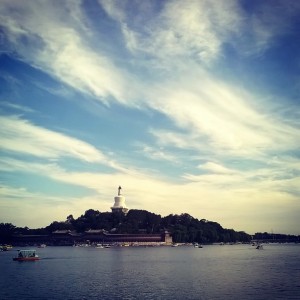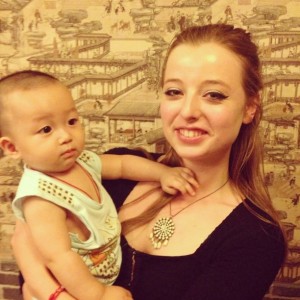旅游时,并不是参观名胜古迹才能给你留下永恒的记忆。
人生给你提供去北大留学一年的机会时,日落的时候没有大巴车等待把你回到宾馆去。自由逛街时,我遇到了许多意外的情况,第一月在中国首都已过去了,这些情况的记忆都还在脑海徘徊一段时间。
一片宁静熠熠的蓝湖发现在我们的眼前,上面遍布五彩缤纷的小脚踏船。湖中间的岛上白白的西藏寺庙耸于我们上方。
“那个寺庙吸引大量的系藏游客来到这里”我朋友说,“可是把那个寺庙盖在北京帝国花园中间可不算是表现一种敬佩,而是北京控制西藏的象征”。
我们穿过小花园并皇帝曾经散步的院子而绕着北京著名的北海公园。突然我们遇到了站在水里的凉亭。从凉亭里传来了电子节奏。在这么安静的环境里听到强烈的音乐可让我们吓了一跳。接近一点,热情跳舞的一群老人出现在我们眼前。
每一对看起来全神贯注于舞步,而且旁观者禁不住也全身贯注于他们,所以一大群人聚集在老人周围是不言而喻的。实际上,在中国老人一起跳舞是很常见的现象。我不由自主想起英国老人参加公开活动的缺乏。
旁边的凉亭充满小群人,四围都是乐谱。手里拿着西方和东方传统乐器,各种各样旋律灌满了凉亭。这个画面又是一片能反映中国现代生活的快照。因为大部分城市人口住在一般互相叠压的公寓楼里, 邻居仅仅隔着一道墙。于此,在中国很多公园里你可以看到很多人在演奏乐器,远离邻居抱怨的声音。
北京798艺术区,从一条窄窄胡同的隐藏门口里走出了一个衣着光鲜的男人,西装笔挺,领带鲜艳。他以优雅亲切的态度迎接我们,她的法国口音浓重。我们跟着他进去了一个装了闪亮镜子的画廊,展示一个本地新兴的艺术家。
“来这里之前连画商我也没有学过。在巴西我上了商业本科,在中国为了成功这就是足够的。关系是最关键的,在正确的时间,正确的地点,遇到了正确的人。在这里资历不用过高,而只需要趁你碰到的每一个机会”。
身后回响来参观下一周展览的邀请,眼前是老旧工厂的迷宫。工厂里面是北京现代艺术园地。不知不觉,我们突然走出门口上了屋顶,装置了艺术展,一场网球地,绿绿的球漂浮在从小洞里吹出的气流里。站在屋顶上可以看到紫橙花哨的幼儿园,弃置工厂塔耸现在后面, 曾经生产无线设备,后来公司搬走了,离开了城市,后来北京现在最流行的画廊悄悄地蔓延搬进来。
我们一小群人站在小区门口外面。一对穿着黑制服的小伙子匆匆过去,看到他们究竟是两个保安,大概刚刚下班,让我大吃一惊。他们相逐,弯腰捧腹,一个把门关上,让对方吃闭门羹,然后大笑逃跑去。
我想起一般上班保安的样子,面无表情,站着一动不动。下了班,看到这些成人像小区游乐场的小孩子一样玩耍让我惊讶。可是,自己自鸣得意地相信他们回家以后就会继续坐着一动不动,不苟言笑,好像他们还没下班一样,也让我惊讶。
我们围坐在桌子旁,上面摆满了中秋节的酒菜:月饼、新鲜大螃蟹、冰镇水果、芫荽豆腐。身边都是两年前的寄宿家庭。我们都为了满月和聚集干杯!在家里你也会听到一些私人的想法。
因为我是中文系的学生,全家人都自然地对我对中国文化历史的理解感兴趣。我们在谈清朝,中国古代王朝之一,清朝皇帝秦始皇焚书坑儒,如此他会控制老百姓,因为他们教育水平不够于质疑权威。家庭的父亲接着做个比方,让我吃惊:毛主席也焚书坑儒,关大学和学校的门,他也不让老百姓提高教育水平,保护他的权威并防止毛主义的批评。跟中国家庭讨论这个有些忌讳的话题让我感到又不安又荣幸。
这些只是新搬过来住民小趣的故事。面前一个月我打算在北大校园进一步探索,国庆节的时候要参观中国最著名的四川熊猫基地和国家公园九寨沟,另外加入更多中国朋友的小圈。这一年的留学还在初期中!
ENGLISH TRANSLATION
The most lasting memories about a place are not always made at the most famous tourist attractions.
When you find yourself offered a year to study at Beijing University, there is no longer a tourist bus waiting to take you back to the hotel at the end of the day. Wandering freely through the streets, I have found myself chancing on more that one unexpected scene which has lingered in my memory during this first month in China’s capital.
Before us spreads a glittering blue lake of utmost calm, on top of which are dotted pedal boats in a multitude of colours. In the centre a pure white Tibetan temple towers above us.
“That temple attracts huge numbers of Tibetan tourists” my friend comments. “But putting it in the centre of one of the imperial gardens is more of a sign of Beijing’s control over the area, rather than showing a kind of reverence”.
We circle around Beihai park, passing through small gardens and courtyards where the emperor would have once himself strolled. Out of the blue, we come across pavilions stood in the water. From inside the sound of an electronic beat floats towards us. Hearing such a sound in these peaceful surrounding almost gives us a fright. Drawing near, a group of elderly people whirling around appears before our eyes.
Each couple seems completely engrossed in their movements, and it is impossible for onlookers not also to become absorbed in this mesmerising ritual. Needless to say, quite a large crowd has gathered around them. In fact, groups of older men and especially women dancing in groups are very common here. I cannot help but think about the lack of public exposure of the elderly in the UK.
A short walkway leads us onto the next pavilion, around the edge of which are small groups surrounded by piles of sheet music. In their hands are a mix of Western and Chinese traditional instruments, and the air is filled with a cacophony of different melodies; yet another telling snapshot about life in modern China; as most of the urban population live in apartment blocks piled on top of each other, proximity to neighbours mean practising at home may lead to quarrels. Hence, in many of China’s parks you can find people playing their instruments away from their neighbours complaints.
A sharply dressed man with a crisp cut suit and colourful tie steps out of a hidden doorway down a back alley of Beijing’s art district, 798. He greets us graciously in a thick French accent and leads us into a brightly mirrored gallery showcasing an up-and-coming local artist.
I had never even studied art dealership before I came here. I took a course in business back in Paris, and that was enough for me to find success in China. It’s all about connections, meeting people at the right time. You don’t have to be overqualified here, just inventive enough to take advantage of the the opportunities you come across”
Leaving behind invitations to more showcases next week, we wander through seemingly abandoned maze of old factory buildings. Inside are exhibitions home to Beijing’s modern art scene. Without realising, we find ourselves up on the rooftop. An art installation in the form of a tennis court with jet streams of air suspending bright green balls has been installed. The rooftop offers a view of a gaudily painted children’s nursery, behind which looms the chimney of an abandoned factory tower, which would have once been the furnace to wireless equipment, before the companies moved out of the city and in crept the cities now most popular galleries and studios.
We stand in a small gathering on the corner of our apartment compound. A pair of guys dressed in black uniforms rushes past us, and I am surprised to see they are two security guards who have probably just finished their shift. They chase each other, bent over in a fit of giggles, as one pulls the gate to the compound shut in the others face before running off cackling.
I think of the typical security guard when on duty; expressionless face, motionless stance. Away from their posts, I am surprised to see these grown men playing like the children in our compound’s playground. And yet, I am also surprised in my own complacent belief that maybe when they got home they would continue to sit, unmoving, unsmiling, like they had never left their station.
We sit around a dining table weighed down with Autumn Festival delicacies; mooncakes, fresh crabs, iced fruit, fresh tofu steeped in coriander. Around me are my host family from two years previously. We all raise a toast to the full moon and family reunion. Being invited into the family circle also reveals some interesting insights into their more personal thoughts.
Naturally, as a student of Chinese studies they are interested in my knowledge about Chinese culture and history. We are discussing one of China’s ancient dynasties, the Qing, whose emperor supposedly burnt all the books in the kingdom and executed the scholars in order to keep the ordinary people uneducated enough to not question his authority. The father then makes an analogy which takes me by surprise: that Chairman Mao carried out a similar process when in power; he also kept the masses uneducated (closing universities and schools) to maintain his power and prevent educated criticism of his ideology. I feel both uneasy and honoured to be discussing a relative taboo here with a Chinese family.
These are just some small observations of a new resident in Beijing. Ahead lies another month in which I plan to cycle further into Beijing’s University’s sprawling campus, visit China’s most famous panda sanctuary and national park Jiuzhaigou during National Holiday, and infiltrate more circles of Chinese friends. My year is still only just beginning!


